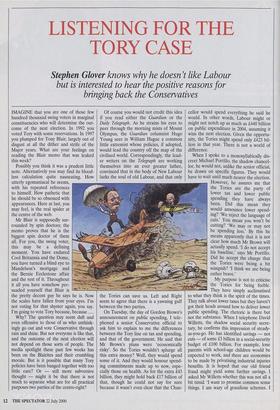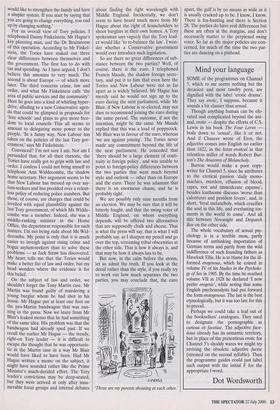LISTENING FOR THE TORY CASE
Stephen Glover knows why he doesn't like Labour
but is interested to hear the positive reasons for bringing back the Conservatives
IMAGINE that you are one of those few hundred thousand swing voters in marginal constituencies who will determine the out- come of the next election. In 1992 you voted Tory with some reservations. In 1997 you plumped for Tony Blair, largely out of disgust at all the dither and strife of the Major years. What are your feelings on reading the Blair memo that was leaked this week?
Possibly you think it was a prudent little note. Alternatively you may find its blood- less calculation quite nauseating. How utterly egomaniacal he seems, with his repeated references to himself. How pathetic that he should be so obsessed with appearances. Here at last, you may feel, is the real spider at the centre of the web.
Mr Blair is supposedly sur- rounded by spin doctors; the memo proves that he is the biggest spin doctor of them all. For you, the swing voter, this may be a defining moment. You have endured Cool Britannia and the Dome, you have turned a blind eye to Mandelson's mortgage and the Bernie Ecclestone affair and the rest of it. Throughout it all you have somehow per- suaded yourself that Blair is the pretty decent guy he says he is. Now the scales have fallen from your eyes. I'm not voting for that shyster again, you say. I'm going to vote Tory because, because ....
Why? The question may seem daft and even offensive to those of us who unthink- ingly go out and vote Conservative through rain and shine. But not everyone is like that, and the outcome of the next election will not depend on those sorts of people. The media spotlight these past few weeks has been on the Blairites and their crumbling morale. But is it possible that many Tory policies have been banged together with too little care? Or — still more subversive thought — might it be that there is not much to separate what are for all practical purposes two parties of the centre-right? Of course you would not credit this idea if you read either the Guardian or the Daily Telegraph. As he strains his eyes to peer through the morning mists of Mount Olympus, the Guardian columnist Hugo Young sees in William Hague a common little extremist whose policies, if adopted, would lead the country off the map of the civilised world. Correspondingly, the lead- er writers on the Telegraph are working themselves into an ever greater lather, convinced that in the body of New Labour lurks the soul of old Labour, and that only the Tories can save us. Left and Right seem to agree that there is a yawning gulf between the two parties.
On Tuesday, the day of Gordon Brown's announcement on public spending, I tele- phoned a senior Conservative official to ask him to explain to me the differences between the Tory line on tax and spending, and that of the government. He said that Mr Brown's plans were 'economically risky'. So the Tories wouldn't splurge all this extra money? Well, they would spend some of it. And they would honour spend- ing commitments made up to now, espe- cially those on health. As for the extra £43 billion, they might hold back £17 billion of that, though he could not say for sure because it wasn't even clear that the Chan- cellor would spend everything he said he would. In other words, Labour might or might not notch up as much as £440 billion on public expenditure in 2004, assuming it wins the next election. Given the opportu- nity, the Tories might spend only £423 bil- lion in that year. There is not a world of difference.
When I spoke to a monosyllabically dis- creet Michael Portillo, the shadow chancel- lor, he would not, unlike the senior official, be drawn on specific figures. They would have to wait until much nearer the election. However, he assures me that the Tories are the party of lower tax and lower public spending they have always been. Did this mean they would announce lower spend- ing? 'We reject the language of cuts.' You mean you won't be cutting? 'We may or may not be spending less.' By this he means apparently that it is not clear how much Mr Brown will actually spend. 'I do not accept his baseline,' says Mr Portillo. Did he accept the charge that the Tories were being a bit wimpish? 'I think we are being rather brave.'
My purpose is not to criticise the Tories for being feeble. They have simply acclimatised to what they think is the spirit of the times. They talk about lower taxes but they haven't got their heads around how to deliver lower public spending. The rhetoric is there but not the substance. When I telephone David Willetts, the shadow social security secre- tary, he confirms this impression of steady- as-you-go. He has identified savings — not cuts — of some £3 billion in a social-security budget of £100 billion. For example, lone parents with school-age children would be expected to work, and there are economies to be made by privatising industrial injuries benefits. It is hoped that our old friend fraud might yield some further savings. I asked Mr Willetts whether this was not all a bit timid. 'I want to promise common sense things. I am wary of grandiose schemes. I would like to strengthen the family and have a simpler system. If you start by saying that you are going to change everything, you end up by changing nothing.'
For an overall view of Tory policies, I telephoned Danny Finkelstein, Mr Hague's key planning man, and the Dr Brainstorm of this operation. According to Mr Finkel- stein, the Tories have staked out three clear differences between themselves and the government. The first has to do with tax and spending. As I have argued, I don't believe this amounts to very much. The second is about Europe — of which more later. The third concerns crime, law and order, and what Mr Finkelstein calls 'the area of public services and the community'. Here he goes into a kind of whirling hyper- drive, alluding to a new Conservative agen- da that could be glimpsed in proposals for `free schools' and plans to give more free- dom to local councils This all seems to amount to delegating more power to the people. 'In a funny way, New Labour has taken on the policies of the last Tory gov- ernment,' says Mr Finkelstein.
Convinced? I'm not sure I am. Nor am I persuaded that, for all their rhetoric, the Tories have really got to grips with law and order. I confess I could not bring myself to telephone Ann Widdecombe, the shadow home secretary. Her argument seems to be that New Labour has messed up over asy- lum-seekers and has presided over a relent- less policy of reducing police numbers. But those, of course, are charges that could be levelled with equal plausibility against the last Tory government, of which Ms Widde- combe was a member. Indeed, she was a middle-ranking minister in the Home Office, the department responsible for such matters. I'm not being rude about Ms Wid- decombe. My point is only that it is much easier to inveigh against rising crime and bogus asylum-seekers than to solve these problems — as Jack Straw has discovered. My heart tells me that the Tories would make a better fist of law and order, but my head wonders where the evidence is for this belief.
On the subject of law and order, we shouldn't forget the Tony Martin case. Mr Martin was found guilty of murdering a young burglar whom he had shot in his house. Mr Hague put at least one foot on the pro-Martin bandwagon that was run- ning in the press. Now we learn from Mr Blair's leaked memo that he had something of the same idea. His problem was that the bandwagon had already sped past. If we recall the earlier Mr Hague — the trendy, right-on Tory leader — it is difficult to escape the thought that he was opportunis- tic in the Martin case in a way Mr Blair would have liked to have been. Had Mr Hague written a memo on the subject, it might have sounded rather like the Prime Minister's much-derided effort. The Tory leader's convictions may be deep-seated, but they were arrived at only after innu- merable focus groups and internal debates about finding the right wavelength with Middle England. Incidentally, we don't seem to have heard much more from Mr Hague about the right of householders to shoot burglars in their own homes. A Tory spokesman says vaguely that the Tory lead- er would like 'to re-balance the law'. I won- der whether a Conservative government would ever introduce such legislation.
So are there no great differences of sub- stance between the two parties? Well, of course, there is the euro. I telephoned Francis Maude, the shadow foreign secre- tary, and put it to him that even here the Tories and New Labour were not as far apart as is widely believed. Mr Hague has merely said he would not sign up to the euro during the next parliament, while Mr Blair, if New Labour is re-elected, may not dare to recommend joining the euro during the same period. The outcome, if not the intention, might be the same. Mr Maude replied that this was a load of poppycock. Mr Blair was in favour of the euro, whereas `we are against joining'. The Tories never made any commitment beyond the life of the next parliament. He conceded that `there should be a large element of conti- nuity in foreign policy', and was unable to point to foreign-policy differences between the two parties that went much beyond style and outlook — other than on Europe and the euro. There he was adamant that there is an enormous chasm, and he is probably right.
We are possibly only nine months from an election. We may be sure that it will be bitterly fought, and that the swing voter of Middle England, on whom everything depends, will be offered two alternatives that are supposedly chalk and cheese. That is what the press will say, that is what I will probably say, as I sharpen my pencil and go over the top, screaming tribal obscenities at the other side. That is how it always is, and that may be how it always has to be.
But now, in the calm before the storm, let us admit the truth. If you look at the detail rather than the style, if you really try to work out how much separates the two parties, you may conclude that, the euro `Those are my parents shouting at each other.' apart, the gulf is by no means as wide as it is usually cracked up to be. I know, I know. There is fox-hunting and there is Section 28. The parties do have real differences but these arc often at the margins, and don't necessarily matter to the perplexed swing voter. So far as the major policies are con- cerned, for much of the time the two par- ties are dancing on a pinhead.



























































 Previous page
Previous page